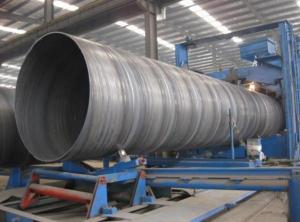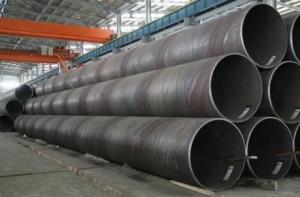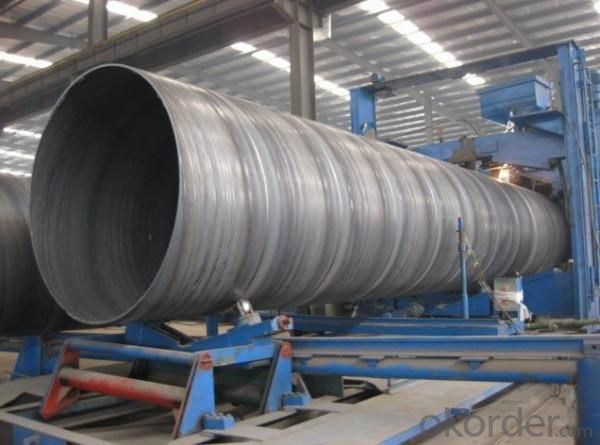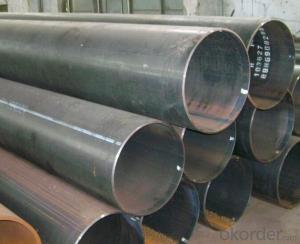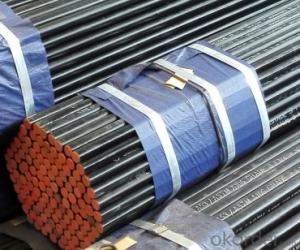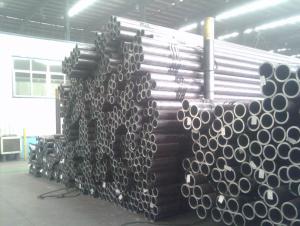SSAW Welded Steel Pipes Carbon API SPEC 5CT ASTM A53
- Loading Port:
- Tianjin Port
- Payment Terms:
- TT or L/C
- Min Order Qty:
- 50MT m.t.
- Supply Capability:
- based on order m.t./month
OKorder Service Pledge
OKorder Financial Service
You Might Also Like
1.Specification of SSAW Welded Steel Pipes Carbon API SPEC 5CT ASTM A53
1)Application: It is widely applied to line pipe in oil and sewage transportation , and it is used in Low pressure liquid and gassy transportation and it is also good Structure pipe in building and bridge field.
2)Standard: API SPEC 5L, API SPEC 5CT, ASTM A53, GB/T9700.1
3)Steel Grade: API SPEC 5L: B, X42, X46, X52, X56, X60, X65;API SPEC 5CT: J55, K55, N80, L80-1; ASTM A53: A, B, C; GB/T9700.1:L242、L290、L320、L360、L390、L415、L450
2.Sizes of Pipes
*Remark: Besides below sizes, we also can arrange production based on requirement of customers
|
OD |
WT | ||||||||
|
NoninalPipe size Inches |
OD MM |
10 |
20 |
30 |
STD |
40 |
60 |
XS |
80 |
|
12 |
323.90 |
|
6.35 |
8.38 |
9.53 |
10.31 |
14.27 |
12.70 |
17.48 |
|
14 |
355.60 |
6.35 |
7.92 |
9.53 |
9.53 |
11.13 |
15.09 |
12.70 |
19.05 |
|
16 |
406.40 |
6.35 |
7.92 |
9.53 |
9.53 |
12.7 |
16.66 |
12.70 |
21.44 |
|
18 |
457.00 |
6.35 |
7.92 |
11.13 |
9.53 |
14.27 |
19.05 |
12.70 |
23.88 |
|
20 |
508.00 |
6.35 |
9.53 |
12.7 |
9.53 |
15.09 |
20.62 |
12.70 |
26.19 |
|
22 |
559.00 |
6.35 |
9.53 |
12.7 |
9.53 |
|
22.23 |
12.70 |
28.58 |
|
24 |
610.00 |
6.35 |
9.53 |
14.27 |
9.53 |
17.48 |
24.61 |
12.70 |
30.96 |
|
26 |
660.00 |
7.92 |
12.70 |
|
9.53 |
|
|
12.70 |
|
|
28 |
711.00 |
7.92 |
12.70 |
15.88 |
9.53 |
|
|
12.70 |
|
|
30 |
762.00 |
7.92 |
12.70 |
15.88 |
9.53 |
|
|
12.70 |
|
|
32 |
813.00 |
7.92 |
12.70 |
15.88 |
9.53 |
17.48 |
|
12.70 |
|
|
34 |
864.00 |
7.92 |
12.70 |
15.88 |
9.53 |
17.48 |
|
12.70 |
|
|
36 |
914.00 |
7.92 |
12.70 |
15.88 |
9.53 |
19.05 |
|
12.70 |
|
|
38 |
965.00 |
|
|
|
9.53 |
|
|
12.70 |
|
|
40 |
1016.00 |
|
|
|
9.53 |
|
|
12.70 |
|
|
42 |
1067.00 |
|
|
|
9.53 |
|
|
12.70 |
|
|
44 |
1118.00 |
|
|
|
9.53 |
|
|
12.70 |
|
|
46 |
1168.00 |
|
|
|
9.53 |
|
|
12.70 |
|
|
48 |
1219.00 |
|
|
|
9.53 |
|
|
12.70 |
|
3. Packing & Delivery
Packing Detail: Bundles with anti-rust painting and with plastic caps
Delivery Term: 30 days after receving payment or L/C
4. Data Sheet
Standard: API SPEC 5L
Mechanical Properties
|
Standard |
Grade |
(MPa) |
(MPa) | ||
|
Yield strength |
Tensile Strength | ||||
|
API SPEC 5L |
PSL1 | ||||
|
B |
≥241 |
≥414 | |||
|
×42 |
≥290 |
≥414 | |||
|
×46 |
≥317 |
≥434 | |||
|
×52 |
≥359 |
≥455 | |||
|
×56 |
≥386 |
≥490 | |||
|
×60 |
≥414 |
≥517 | |||
|
×65 |
≥448 |
≥531 | |||
|
×70 |
≥483 |
≥565 | |||
|
PSL2 | |||||
|
Min |
Max |
Min |
Max | ||
|
B |
241 |
448 |
441 |
758 | |
|
×42 |
290 |
496 |
414 |
758 | |
|
×46 |
317 |
524 |
434 |
758 | |
|
×52 |
359 |
531 |
455 |
758 | |
|
×56 |
386 |
544 |
490 |
758 | |
|
×60 |
414 |
565 |
517 |
758 | |
|
×65 |
448 |
600 |
531 |
758 | |
|
×70 |
483 |
621 |
565 |
758 | |
Chemical Composition(%)
|
Standard |
Grade |
C |
Mn |
P |
S |
TI |
CEV |
|
Max |
Max |
Max |
Max |
Max |
Max | ||
|
API SPEC 5L |
PSL1 | ||||||
|
B |
0.26 |
1.2 |
0.030 |
0.030 |
0.04 |
- | |
|
×42 |
0.26 |
1.3 |
0.030 |
0.030 |
0.04 | ||
|
×46,×52,×56,X60 |
0.26 |
1.4 |
0.030 |
0.030 |
0.04 | ||
|
X65 |
0.26 |
1.45 |
0.030 |
0.030 |
0.06 | ||
|
X70 |
0.26 |
1.65 |
0.030 |
0.030 |
0.06 | ||
|
PSL2 | |||||||
|
B |
0.22 |
1.20 |
0.025 |
0.015 |
0.04 |
0.43 | |
|
×42 |
0.22 |
1.30 |
0.025 |
0.015 |
0.04 | ||
|
×46,×52,×56, X60 |
0.22 |
1.40 |
0.025 |
0.015 |
0.04 | ||
|
X65 |
0.22 |
1.45 |
0.025 |
0.015 |
0.06 | ||
|
X70 |
0.22 |
1.65 |
0.025 |
0.015 |
0.06 | ||
Standard: ASTM A53
Mechanical Properties
|
Standard |
Grade |
(MPa) |
(MPa) |
|
Yield strength |
Tensile Strength | ||
|
ASTM A53M |
A |
205 |
330 |
|
B |
240 |
415 |
Chemical Composition(%)
|
Standard |
Grade |
C |
Mn |
P |
S |
V |
Ni |
Cu |
Cr |
Mo |
|
Max |
Max |
Max |
Max |
Max |
Max |
Max |
Max |
Max | ||
|
ASTM A53M |
A |
0.25 |
0.95 |
0.05 |
0.045 |
0.08 |
0.4 |
0.5 |
0.4 |
0.15 |
|
B |
0.30 |
1.20 |
0.05 |
0.045 |
0.08 |
0.4 |
0.5 |
0.4 |
0.15 |
5. Products Showroom
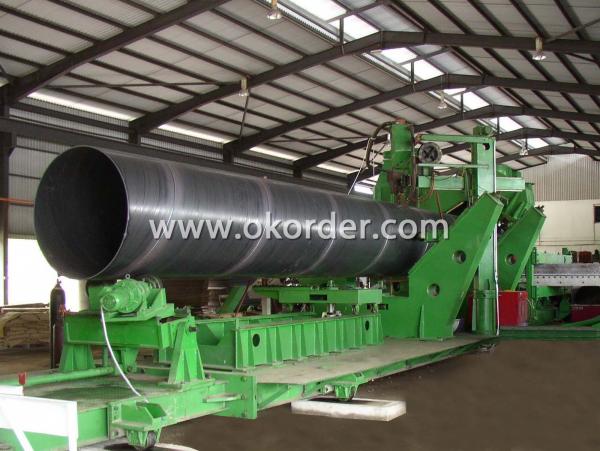
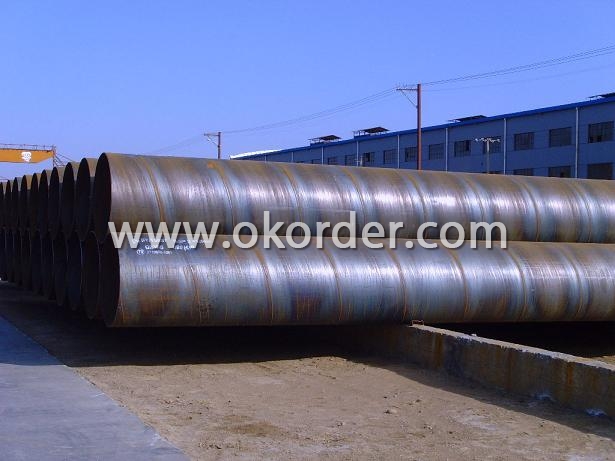
- Q: What is the difference between steel pipe and fiberglass pipe?
- Steel pipe and fiberglass pipe differ in terms of material composition, durability, flexibility, and cost. Steel pipe is made of steel, which provides strength and resilience, making it ideal for high-pressure applications and underground installations. Fiberglass pipe, on the other hand, is composed of reinforced plastic fibers, resulting in a lightweight and corrosion-resistant material suitable for above-ground and corrosive environments. While steel pipe offers higher tensile strength, fiberglass pipe excels in its flexibility, allowing for easier installation and reduced maintenance. Additionally, steel pipe is typically more expensive due to the cost of materials and manufacturing processes, while fiberglass pipe is more cost-effective in terms of initial installation and long-term maintenance.
- Q: Can steel pipes be used in the oil and gas industry?
- Indeed, the oil and gas industry commonly utilizes steel pipes. Renowned for their robustness, longevity, and resistance to corrosion, steel pipes are well-suited for the transportation and storage of diverse fluids and gases within this sector. They possess the ability to endure high pressure and extreme temperatures, which are frequently encountered during oil and gas operations. Moreover, the ease with which steel pipes can be welded together facilitates efficient assembly and maintenance. Consequently, steel pipes represent a dependable and economically sound option for the oil and gas industry.
- Q: Can steel pipes be used for oil and gas transportation?
- Yes, steel pipes can be used for oil and gas transportation. Steel pipes are widely utilized in the oil and gas industry due to their strength, durability, and ability to handle high-pressure conditions. They are commonly used for transporting crude oil, natural gas, and their derivatives over long distances. Steel pipes have excellent resistance to corrosion and can withstand extreme temperatures, making them suitable for both onshore and offshore applications. Additionally, steel pipes can be easily welded, allowing for the construction of complex pipeline networks that efficiently transport oil and gas from production fields to refineries and distribution centers.
- Q: Are steel pipes suitable for use in hydropower plants?
- Yes, steel pipes are suitable for use in hydropower plants. Steel pipes offer several advantages such as high strength, durability, and corrosion resistance, making them ideal for transporting water or fluids in hydropower plants. Additionally, steel pipes can withstand high pressure and temperature conditions, ensuring smooth and efficient operation of the hydropower plant.
- Q: Can steel pipes be used for underground transportation tunnels?
- Underground transportation tunnels can indeed utilize steel pipes. For a multitude of purposes like water, gas, and sewage transportation, steel pipes are commonly employed in the construction of these tunnels. Renowned for their resilience, durability, and ability to resist corrosion, steel pipes are remarkably suitable for underground applications. With the capacity to endure the weight and pressure exerted by the nearby soil, they can also be reinforced to guarantee stability. Moreover, steel pipes offer flexibility in tunnel design as they can be manufactured in various sizes and lengths. Nonetheless, one must carefully consider factors such as soil conditions, load-bearing capacity, and potential environmental impacts before opting for steel pipes in underground transportation tunnels.
- Q: Can steel pipes be used for conveying hydraulic fluids?
- Yes, steel pipes can be used for conveying hydraulic fluids. Steel pipes have high tensile strength and excellent resistance to high pressure, making them suitable for hydraulic applications. They can withstand the high operating pressures and temperature fluctuations that hydraulic systems often experience. Additionally, steel pipes are durable and have a long lifespan, ensuring reliable and efficient fluid transmission in hydraulic systems. However, it is important to ensure that the steel pipes used are compatible with the specific hydraulic fluid being conveyed to prevent corrosion or degradation of the pipe material.
- Q: How are steel pipes used in geothermal energy systems?
- Steel pipes are an essential component in geothermal energy systems as they are used to transport the hot water or steam extracted from the underground reservoirs to the surface. These pipes are designed to withstand high temperatures and pressure, ensuring the safe and efficient transfer of geothermal fluids. Additionally, steel pipes are also utilized in the construction of geothermal power plants, connecting various components like heat exchangers and turbines, facilitating the generation of renewable and sustainable energy.
- Q: What industries typically use steel pipes?
- Steel pipes find widespread use across various industries due to their durability, strength, and versatility. Some of the sectors that typically employ steel pipes include: 1. Construction: Steel pipes are extensively utilized in the construction industry for diverse purposes like structural support, plumbing, and underground piping systems. They are commonly seen in commercial buildings, residential structures, bridges, and tunnels. 2. Oil and gas: The oil and gas industry heavily relies on steel pipes for drilling, transporting, and distributing oil and gas. Steel pipes are employed in offshore drilling rigs, oil refineries, natural gas processing plants, and pipelines to ensure the safe and efficient transport of these valuable resources. 3. Water and wastewater: Steel pipes play a crucial role in providing clean water supply and managing wastewater. They are used in water treatment plants, desalination facilities, and municipal water distribution systems. Steel pipes are also essential for sewage and stormwater management. 4. Manufacturing: Various manufacturing industries employ steel pipes for specific applications. For example, automobile manufacturers use steel pipes in exhaust systems, fuel lines, and hydraulic systems. Steel pipes are also utilized in the production of machinery, equipment, and appliances. 5. Mining: The mining industry requires robust and enduring materials for its operations. Steel pipes are used in mining applications such as conveying materials, ventilation systems, and underground infrastructure. They prove particularly useful in transporting minerals, ores, and other mining byproducts. 6. Energy and power: Steel pipes find extensive use in power generation facilities, including thermal power plants, nuclear power plants, and renewable energy installations. They are employed in steam pipelines, cooling systems, and heat exchangers. Steel pipes are also used in the construction of transmission lines for electricity distribution. 7. Infrastructure and transportation: Steel pipes are essential for infrastructure development and transportation systems. They are used in the construction of roads, bridges, railways, and airports. Steel pipes also play a role in the transportation of fluids and gases, such as in natural gas or petroleum product pipelines. Overall, the versatility and dependability of steel pipes make them indispensable in a wide range of industries, contributing to various aspects of our modern infrastructure and daily lives.
- Q: What are low-pressure carbon steel tubes?
- It's pressure levelThe design pressure (P) of pressure vessel is divided into four pressure levels: low voltage, medium pressure, high pressure and extra high pressure:(1) low voltage: Code L, 0.1MPa is less than or equal to p<1.6MPa(2) MP: Code M, 1.6MPa is less than or equal to p<10.0MPa(3) high voltage: Code H, 10.0MPa is less than or equal to p<100.0MPa(4) high voltage: Code U, P = 100.0MPa
- Q: What are the different pipe fittings used with steel pipes?
- Some different pipe fittings used with steel pipes include elbows, tees, reducers, couplings, and flanges.
1. Manufacturer Overview
| Location | Tianjin, China |
| Year Established | 2001 |
| Annual Output Value | 500,000Tons |
| Main Markets | Southeast Asia; Middle East; Oceania; Americas; Europe; Africa;etc. |
| Company Certifications | API 5L;API 5CT;ISO9001:2008 GB/T 19001-2008 |
2. Manufacturer Certificates
| a) Certification Name | |
| Range | |
| Reference | |
| Validity Period |
3. Manufacturer Capability
| a) Trade Capacity | |
| Nearest Port | Tianjin;Qingdao |
| Export Percentage | 50% - 60% |
| No.of Employees in Trade Department | 1000-1100 People |
| Language Spoken: | English; Chinese; Spanish |
| b) Factory Information | |
| Factory Size: | Above 150,000 square meters |
| No. of Production Lines | Above 10 |
| Contract Manufacturing | OEM Service Offered; Design Service Offered |
| Product Price Range | Average |
Send your message to us
SSAW Welded Steel Pipes Carbon API SPEC 5CT ASTM A53
- Loading Port:
- Tianjin Port
- Payment Terms:
- TT or L/C
- Min Order Qty:
- 50MT m.t.
- Supply Capability:
- based on order m.t./month
OKorder Service Pledge
OKorder Financial Service
Similar products
Hot products
Hot Searches
Related keywords
